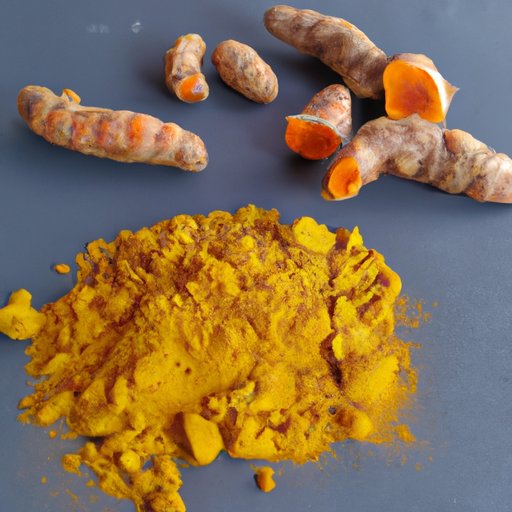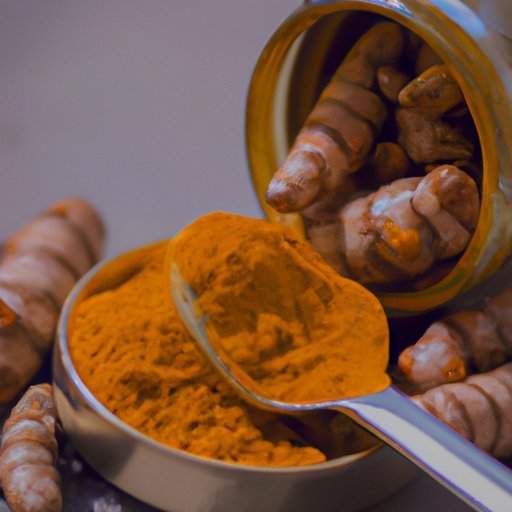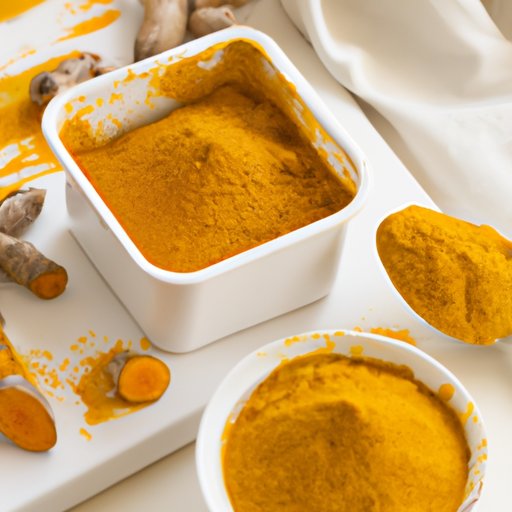Introduction
Turmeric is a popular spice that has been used for centuries in traditional Indian and Asian cuisines. But it’s not just known for its flavorful taste – it also has a long history of being used for medicinal purposes. This article will explore the potential health benefits of turmeric, as well as its possible side effects. We’ll also provide some tips on incorporating it into your diet with recipes and cooking tips.

Overview of Turmeric and Its Potential Health Benefits
What Is Turmeric? Turmeric is a flowering plant native to tropical regions of South Asia. The root of the plant is dried and ground into a bright yellow powder, which is commonly used in curries, marinades, and other sauces. It has a slightly pungent, earthy flavor.
Turmeric has been used in traditional medicine for centuries, and recent research suggests that it may have potential health benefits. Studies suggest that turmeric may help reduce inflammation, improve digestion, and boost the immune system. It may even have anti-cancer properties.

Exploring the Benefits of Turmeric for Overall Health
How Turmeric Can Help Improve Your Diet and Nutrition: Turmeric is a rich source of nutrients, including iron, vitamin C, magnesium, and potassium. It’s also a good source of fiber, which can help keep you feeling full and promote healthy digestion.
The Science Behind Turmeric: What Studies Show About Its Benefits: Numerous studies have looked at the potential health benefits of turmeric. For example, one study found that taking a daily dose of curcumin (the active ingredient in turmeric) for eight weeks reduced inflammation markers in people with rheumatoid arthritis.
Other studies have suggested that turmeric may have anti-cancer properties and may help reduce the risk of heart disease. However, more research is needed to confirm these potential benefits.
An Overview of the Potential Risks and Side Effects of Turmeric
Possible Interactions with Medications: Turmeric may interact with certain medications, such as blood thinners and diabetes medications. If you’re taking any medications, be sure to talk to your doctor before adding turmeric to your diet.
Potential Allergies and Sensitivities: Some people may be allergic or sensitive to turmeric. If you experience symptoms such as itching, rash, hives, or difficulty breathing after consuming turmeric, stop using it immediately and seek medical attention.

A Guide to Cooking with Turmeric: Recipes and Tips
Understanding Different Forms of Turmeric and Their Uses: Turmeric is available in several forms, including fresh, dried, and powdered. Fresh turmeric has a milder flavor and is often used in stir-fries and other dishes. Dried and powdered turmeric are typically used in curries and other sauces.
Spice Blends and Recipes Featuring Turmeric: Turmeric is often used in combination with other spices such as cumin, coriander, and ginger. It’s also a key ingredient in many Indian and Asian dishes, such as curry, tikka masala, and dal.
Tips for Incorporating Turmeric into Everyday Meals: Turmeric is easy to add to your diet. Try sprinkling it on roasted vegetables or stirring it into soups and stews. You can also try using it in smoothies or adding it to salad dressings.
Conclusion
Summary of Benefits and Potential Risks of Turmeric: Turmeric is an ancient spice that has been used for medicinal and culinary purposes for centuries. Studies suggest that it may have potential health benefits, such as reducing inflammation and improving digestion. However, it may also interact with certain medications and cause allergic reactions in some people.
Final Thoughts on Using Turmeric for Improved Health: Turmeric is a flavorful and versatile spice that can be easily incorporated into your diet. While it may offer potential health benefits, it’s important to discuss any possible risks with your doctor before adding it to your routine. With the right recipes and cooking tips, you can enjoy the flavor and potential health benefits of turmeric.
(Note: Is this article not meeting your expectations? Do you have knowledge or insights to share? Unlock new opportunities and expand your reach by joining our authors team. Click Registration to join us and share your expertise with our readers.)
